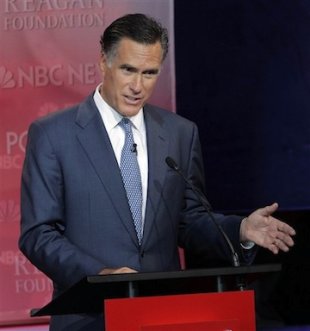
Romney (Jae C. Hong/AP)
When NBC's Brian Williams asked former Gov. Mitt Romney at the most recent Republican presidential debate if he considers himself "a member of the tea party," it may have been the toughest question of the night.As anyone who aligns himself with the small-government movement will tell you, the question was overly simplistic--the tea party is more of an intellectual concept, not an actual centralized organization by any means--but Williams' question clearly struck a nerve. It was one of the only questions during the debate that Romney hesitated before answering, and his meandering response took far more time and effort than what some of his contenders would have expended in the same exchange. ?Herman Cain, for instance, probably would have whistled by the query and just said, "Yes."
"I believe in a lot of what the tea party believes in," Romney said. "The tea party believes that government's too big, taxing too much, and that we ought to get to the work of getting Americans to work. So I put together a plan with a whole series of points of how we can get America's economy going again. Tea party people like that. So if the tea party is for keeping government small and spending down, and helping us create jobs, then, hey, I'm for the tea party."
Interestingly, that's about the same response that tea party-aligned lawmakers provided when I asked if they thought Romney espoused the principles of the movement. All basically gave the same answer: To paraphrase a popular Facebook characterization of a user's relationship status, it's complicated.
"That's not a simple question," Kentucky Sen. Rand Paul, a founding member of the Senate Tea Party Caucus, told me Thursday night as he rushed to a meeting in the Capitol building. He said he didn't have time to give a complete answer, so I caught up with him again outside the Senate chamber an hour later, where he obliged.
"What the tea party stands for, and what unites everybody in the tea party I think, is their concern about the debt, and the concern that we're borrowing so much and printing so much to pay for out debt," Paul said. "And as much as any politician comes towards that, I think they will be embraced. I don't think there's a clear-cut person out there other than Ron Paul and Michele Bachmann, Sarah Palin--people that are at the forefront of the tea party. But I don't have anything negative to say about Romney."
Among grassroots tea party activists, division over the question of supporting Romney are sharper. Uttering the name of the former Massachusetts governor in a room of tea partiers won't get you a unanimous response in the same way there are difference of opinion on several issues, like gay marriage and drug prohibition. When Tea Party Express invited Romney to speak at an even earlier this month, members of FreedomWorks, a separate tea party group, organized a counter protest in the same area. The organization that invited him warned that keeping Romney away would suggest that the movement was closed-minded, while FreedomWorks stressed the importance of preserving the movement's ideological purity.
Movement followers are stil struggling to parse these two tendencies--flexible pragmatism vs. movement purism. And the same dynamic plainly holds among the lawmakers the tea party movement brought to power.
"The principles of the tea party are incredibly simple," Utah Republican Sen. Mike Lee, another founding member of the caucus, told me. "It's all about the fact that the federal government is too big and too expensive, and anyone who supports that proposition can barely align themselves in one way or another with the tea party."? But when I asked if Romney passed that test, there was nothing simple about it. Lee paused, sighed, and said that he didn't have time to offer a complete answer to the question. (He was running into a Senate vote and the deadline was fast approaching.) But Lee took a stab at it anyway: "He understands free markets. He understands how to generate revenue. He understands the limitations of government."
"And anyway, I wish him well," he added abruptly before disappearing behind the doors of the Senate chamber.
When I asked Wisconsin Sen. Ron Johnson, also a freshman senator who ?won election on widespread support from the tea party,? he said he was reserving judgment.
"We'll see based on how he conducts himself on the campaign," Johnson said. "What his ideas are. So, I'm not going to rule people in our out of the movement. Obviously I'm looking for a candidate on the Republican side who is fiscally conservative, who understands that we're bankrupting this nation, who loves this country, realizes that it's way too precious to bankrupt. And who's dedicated to preventing that."
Just like Romney during the debate, no one in the tea party's front ranks could just say, "Yes."
No comments:
Post a Comment